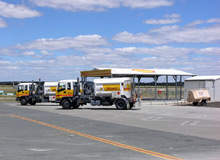
One of the oldest sayings in an aviator’s lexicon is: “You can only have too much fuel when you are on fire.” Because of this attitude, you will never find a better proponent of fuel conservation and economy than an airline flight crew.
Airline pilots think of jet fuel as time. The time the jet fuel affords them, provides increased in-flight options and safety.
While economic issues concerning fuel costs continue to vex the airline industry, flight deck crews are still most concerned with the safety, purity and conservation of the fuel they carry on their aircraft.
Safety used to be assumed, but in the airline world, hard economic times resulted in cost cutting on staff and procedures.
For many carriers, especially at outlying stations, ground staff who were previously employed by the airline are now employed as contract labour.
GUARANTEEING SAFETY
How well do you really know your competitors?
Access the most comprehensive Company Profiles on the market, powered by GlobalData. Save hours of research. Gain competitive edge.

Thank you!
Your download email will arrive shortly
Not ready to buy yet? Download a free sample
We are confident about the unique quality of our Company Profiles. However, we want you to make the most beneficial decision for your business, so we offer a free sample that you can download by submitting the below form
By GlobalDataWhen trained properly, ground-staff at airports are adequately safe, but air crews can no longer depend on their absolute competence when it comes to fuelling their aircraft. Concerns not only surround getting the proper type and amount of fuel, they extend to fuel purity and basic safety practices.
Large transport aircraft must have their fuel distributed properly by the airport ground staff. An imbalance of fuel of just a few hundred pounds beyond the aircraft’s limitations can lead to dangerous flight control problems in the air.
Transport aircraft can be legally dispatched with fuel gauges inoperative but to do this requires the use of magna sticks or drip sticks along various locations on the bottom of the wing tanks. Errors in this procedure can not only lead to major lateral imbalances but inaccurate total fuel loads as well.
Ground staff smoking in areas where aircraft are being fuelled is another concern. To smoke on an aircraft ramp used to be totally forbidden. The practice is still against the rules but on any average day you will find people lighting up within a few dozen metres of fuel trucks and aircraft.
With smoking not allowed in most ground crew break rooms and operations areas, the ramp workers now smoke in little groups on the ramp. This exactly the opposite of the way it was in the recent past.
FUEL CONCERNS
Fuel purity is vital, but since flight crews have no way of keeping contaminants out of the fuel supply, they don’t spend much time worrying about it. Once onboard the aircraft, the main concern about fuel purity revolves around avoiding fuel icing. Fuel heat is available on all jets, and for long-range flights the routes and cruising airspeeds are chosen, in part, to avoid allowing the jet fuel to become too cold to be usable.
Airlines themselves are also adopting new procedures to generate fuel savings, including Virgin Airline’s plans to tow their aircraft to the end of the runway and Scandinavian Airlines’ software called ‘continuous descent approach’ which monitors weather and air traffic at airports to prevent airborne holding.
Even simple things like keeping the compressor, turbine and fans of the engines clean can reduce fuel consumption almost 1.5%.
So while better flight-planning tools, new procedures and improvements in air traffic control systems should lead to significant fuel savings without compromising on safety, good fuel management with the primary focus on flight safety is the best way to get the most out of the airlines biggest operating expense.







